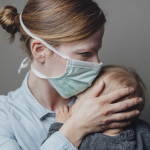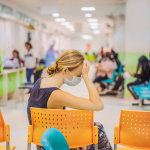Over the last few weeks, our world has changed dramatically. Everything is different, and families are struggling to find their equilibrium. Schools and daycare centers are closed. Many parents are working remotely, while trying to take care of their kids. Most of the United States is under some sort of lockdown, where activities are limited and home is the place we are all supposed to be.
There are all kinds of hassles, but there is also fear. Thousands of people are seriously ill, and many are dying. Places like New York City have been thrown into chaos by COVID-19, and we are told that other cities will soon face the same challenges. The news is filled with dire predictions, and there is no clear endpoint. And this sort of uncertainty breeds anxiety.
This is a particularly challenging time for children. Our colleagues at the Clay Center for Young Healthy Minds have put together a road map to help parents talk to their children about the current situation — 7 Ways to Support Kids and Teens Through the Coronavirus Pandemic. Dr. Eugene Beresin provides the following suggestions:
- Control Your Own Anxiety
- Approach Your Kids and Ask What They Know
- Validate Their Feelings and Concerns
- Be Available for Questions and Provide New Information
- Empower Them by Modeling Behavior
- Provide Reassurance
- Don’t Blame Others
How Children Respond Depends on Their Age
Dr. Paula Rauch, MD and colleagues at Massachusetts General Hospital note that helping children cope can be tailored according to the age of the child.
Infants:
- Infants pick up on the anxieties and actions of those around them, so remain calm when interacting with your infant. Keep routines and their environment consistent.
- Infants may be fussy in reaction to anxieties around them.
Toddlers:
- Keep routines consistent.
- TV and radio news exposure should be limited and only in the presence of an adult.
- Offer videos to watch, read books and play with your child.
- If a toddler asks questions about what is going on, answer in simple terms. Make sure your child knows that you are there to keep him or her safe.
Preschoolers:
- TV and radio news exposure should be limited and only in the presence of an adult.
- If your preschooler asks questions about what is going on, answer in simple terms. Make sure your child knows that you are there to keep him or her safe.
- Spend extra time hugging and cuddling your child.
- Play with your child. Connect with friends, or organize a playgroup.
- Do some type of special activity together. Watch a movie, play a game, bake cookies.
School Age Children:
- TV and radio news exposure should be in the presence of an adult.
- Give children plenty of opportunities to talk about what they think is going on, and clear up misconceptions.
- Encourage children to share their feelings and concerns with you. Let them know it’s all right to be afraid and that you will do everything you can to keep them safe.
- Be available, as this age group may be more interested than younger children in the events but less capable than older children of coping and communicating.
- Reassure kids that many people are keeping them safe and that your family is safe.
- Offer special activities or games to them.
Adolescents:
- Listen, listen, listen.
- Watch TV news with them.
- Engage your adolescent in healthy conversation. “What do you think about the events that are taking place in our world today?” “How did you feel when you first heard about this?”
- Share your feelings with them honestly.
- Encourage them to express their feelings, and brainstorm with them about how they can deal with those feelings.
And Remember to Take Care of Yourself
Although most of us, at least not at the present time, are not directly affected by the pandemic, we are unable to live our normal lives. For many of us, this means that we are not able to do the things we normally do to keep ourselves mentally healthy. We are cut off from our colleagues at work. We can’t hang out with our friends, and we can’t go to the movies or out to eat. And the worrying is exhausting. We worry about getting sick, we worry about our family getting sick. We worry about the financial situation, our jobs, our freedom, the future.
Don’t forget to take care of yourself. Self-care, although it may look different these days, should be at the top (or at least near the top) of your list.
Ruta Nonacs, MD PhD
RESOURCES:
GUIDE TO MENTAL HEALTH RESOURCES FOR COVID-19 (MGH Psychiatry Department)
- 7 Ways to Support Kids and Teens Through the Coronavirus Pandemic (MGH Clay Center)
- How to Help Kids Cope With Situational Anxiety (MGH Clay Center)
- How to Talk to Your Child About the Coronavirus (MassGeneral Hospital for Children)
- Parenting Through Community Crises & Disasters – Handbook and Video (MGH PACT)
- Self-Care for Resilience – Resources for the Whole Family (MGH Clay Center)







Leave A Comment